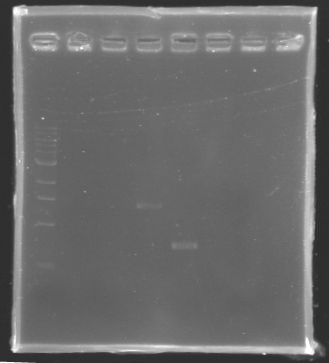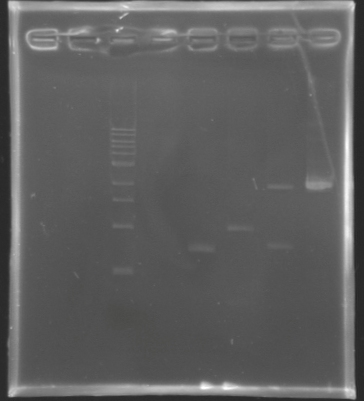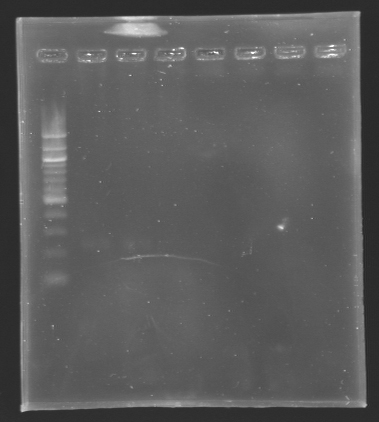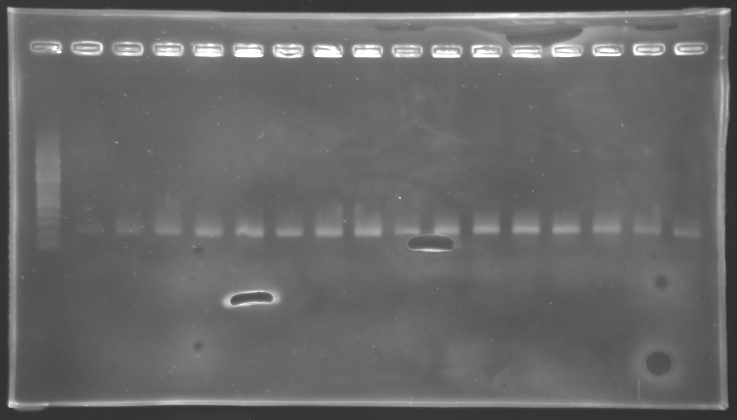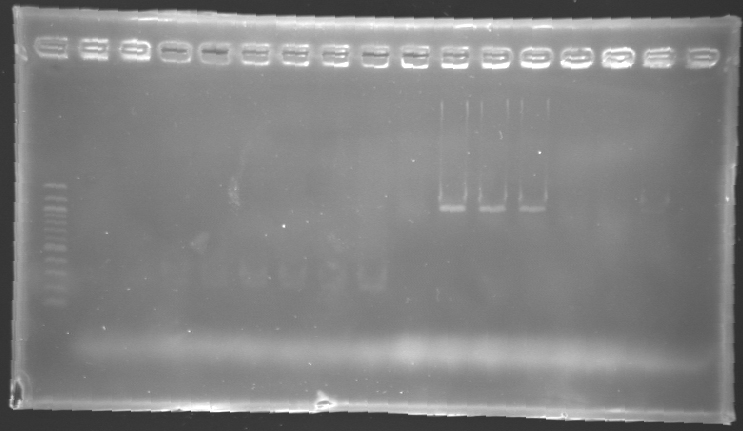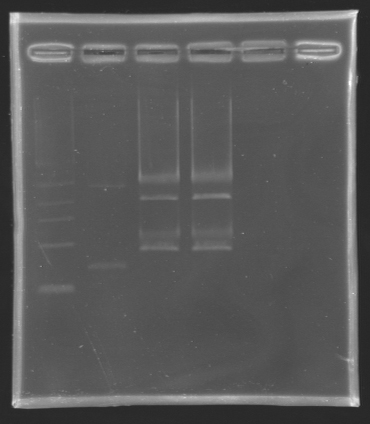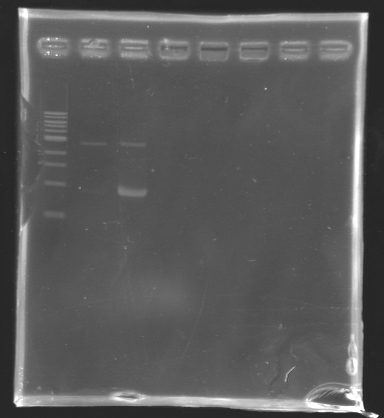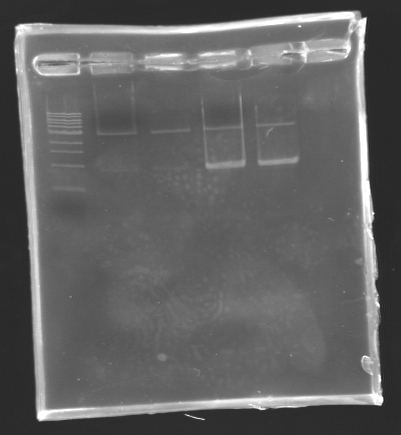Team:Paris/August 8
From 2008.igem.org
(→Gel Extraction and DNA purification) |
(→Protocol) |
||
| (3 intermediate revisions not shown) | |||
| Line 51: | Line 51: | ||
| style="background: #D4E2EF;" | O127 | | style="background: #D4E2EF;" | O127 | ||
| Gene-EnvZ-R | | Gene-EnvZ-R | ||
| - | | | + | | GTTTCTTCCTGCAGCGGCCGCTACTAGTATTATTACCCTTCTTTTGTCGTGCCCTGCGCC |
| - | | | + | | 60 |
| | | | ||
|- style="background: #dddddd;" | |- style="background: #dddddd;" | ||
| style="background: #D4E2EF;" | O131 | | style="background: #D4E2EF;" | O131 | ||
| Gene-FlhC-R | | Gene-FlhC-R | ||
| - | | | + | | GTTTCTTCCTGCAGCGGCCGCTACTAGTATTATTAAACAGCCTGTACTCTCTGTTCATCC |
| - | | | + | | 60 |
| | | | ||
|- style="background: #dddddd;" | |- style="background: #dddddd;" | ||
| Line 75: | Line 75: | ||
| style="background: #D4E2EF;" | O139 | | style="background: #D4E2EF;" | O139 | ||
| Gene-OmpR-R | | Gene-OmpR-R | ||
| - | | | + | | GTTTCTTCCTGCAGCGGCCGCTACTAGTATTATTAGGCCCTTTTCTTGCGCAGCGCTTCT |
| 59 | | 59 | ||
| | | | ||
| Line 771: | Line 771: | ||
====Gel Extraction and DNA purification==== | ====Gel Extraction and DNA purification==== | ||
| - | [[Image: | + | [[Image:KR000138.jpg|thumb|Results of the PCR]] |
'''Electrophoresis settings''' | '''Electrophoresis settings''' | ||
* Gel : 1 % agar | * Gel : 1 % agar | ||
* All the PCR products (Two bands for each template) | * All the PCR products (Two bands for each template) | ||
* 10µL QuickLoad DNA ladder 1 kb | * 10µL QuickLoad DNA ladder 1 kb | ||
| + | |||
| + | Once again we see that the PCR for RBS - worked a lot better than the PCR for RBS +. We will do it again on [[Team:Paris/August_11|monday]]. | ||
| + | |||
| + | To extract RBS - from the gel, we used the standard protocol [[Team:Paris/Notebook/Protocols#Extraction|number 8]].<br> | ||
| + | To purify the DNA we used the standard protocol [[Team:Paris/Notebook/Protocols#Purification_.28Kit_Promega.29|number 10]] | ||
Latest revision as of 13:22, 15 August 2008
|
Minipreps: Plasmid extractionExtraction of pSB3K3 et E0240 in pSB1A2 plasmid from overnight bacteria culture using the QIAspin Miniprep Kit (QIAGEN) by QIACube.
Amplification of Genes of interest (OmpR, EnvZ, FlhDC)We performed PCR on to amplify the sequence in order to have enough amount of DNA to carry out the following of our experiments.
PCR amplificationProtocol
For each sample, 1 µl dNTP
PCR verification/AnalysisAfter the PCR :
ladder : 10µl ladder 1 kb
==> Conclusion : we observed the size expected for the PCR products, but not for FlhDC gene.
Blank : 2µl of buffer EB + 98µl of water
Digestion of PCR productsProtocol :
Analysis by electrophoresis
ladder : 10µl ladder 1 kb
==> Conclusions : We validate the digestion of the vector and the insert. Now we are sure, that we don't detect anything for FlhDC genes. The return of the promotersYesterday, we could not see anything on the electrophoresis after the digestion. Today, we will try the digestion again. Protocol
ResultsTo analyze our digestions, we made an electrophoresis.
Conclusion
*The bands are not visible on this picture, but with a long exposition time, we managed
to see the bands at their right place.
*The concentration of DNA is low!
We will do the ligation tomorrow. Transformation with promotors of interestResults
PCR Screening of Ligation TransformantsUse of 8 clones of Ligation transformants for PCR screening
Protocol of screening PCR
25µl of Quick Load 2X
10µl of ladder 100 pb
Results of electrophoresis
Building of the standard measurement plasmidThis morning we MiniPreped E0240 and pSB3K3 which are the two important parts of the standard measurement plasmid. Before the digestion, we have to determine the DNA concentration of the MiniPreps Measurement of DNA concentration
DigestionProtocol
Results of the digestionElectrophoresis settings
Gel extraction and DNA purificationTo extract the biobrick E0240 from the gel, we used the standard protocol number 8. The ligation will be done tomorrow. Building an other measurement plasmidPCR to create the special E0240ProtocolPCR Mix for cloning with Taq polymerase
We try to build a measurement tool with and without included RBS.
PCR Program LID 105°C ResultsElectrophoresis settings
Conclusion:
- There is DNA that is around 3,000 bp. Actually, it is the template DNA (MP 143), there were too much DNA.
We will have to extract on gel the right piece of DNA.
- RBS - worked better than RBS +.
Gel Extraction and DNA purificationElectrophoresis settings
Once again we see that the PCR for RBS - worked a lot better than the PCR for RBS +. We will do it again on monday. To extract RBS - from the gel, we used the standard protocol number 8. |
|||||||||||||||||||||||||||||||||||||||||||||||||||||||||||||||||||||||||||||||||||||||||||||||||||||||||||||||||||||||||||||||||||||||||||||||||||||||||||||||||||||||||||||||||||||||||||||||||||||||||||||||||||||||||||||||||||||||||||||||||||||||||||||||||||||||||||||||||||||||||||||||||||||||||||||||||||||||||||||||||||||||||||||||||||||||||||||||||||||||||||||||||||||||||||||||||||||||||||||||||||||||||||||||||||||||||||||||||||||||||||||||||||||||||||||||||||||||||||||||||||||||||||||||||||||||
 "
"

